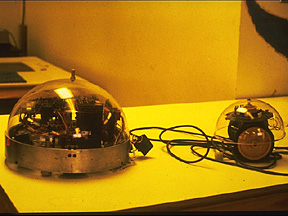| Learning and Computing | Education | Computing | Psychology | Artificial Intelligence |
Variables and Abstraction
The Logo turtle can't deal with abstractions. It must go forward some specific amount or turn through some specific number of degrees. When you key "FD :some-distance", the LOGO interpreter evaluates the symbolic name "some-distance" (looks in the box or storage cell to determine its contents and substitutes that contents for the expression ":some-distance").

Early models of Logo Turtles
People apparently can deal with abstractions, but find problem solving easier when they don't have to do so. Most often when a new procedure is being written, people use specific operand values, e.g. FD 100, which they later change to variable form, such as FD :some-distance. The nature of the abstraction involved is common to some other examples of mathematics as well. The famous mathematician Bourbaki describes the creation of an axiomatic system as proceding from the mathematician's working out a series of theorems with very concrete examples in mind and subsquently examining the inferences of his theorems to define precisely which characteristics of his examples were used by the theorems. In a third step, he redefines the set of objects to which his axioms apply as that most general class of objects having all those characteristics used in the theorems. That is, he bases his generalization on the operations he performed and not on a list of the characteristics of the example he began with. We stress that the process through which a child generalizes a procedure after creating a concrete product with a concrete precursor, this child's play, is a particular kind of abstraction of value in the most intellectual endeavors as well.
This mathematical form of abstraction is called reflexive abstraction by Piaget, where he sees the child creating his own mind through processes of thought that are like those of Bourbaki's mathematician. This points to the most significant potential impact of computer experience on children developing their minds. Reflexive abstraction may become more "natural" to them than what Piaget calls "aristotelian abstraction" (abstraction by feature selection and classification) with which Piaget contrasts it. That is, more children of the future may more often think like mathematicians than do children of today.
Publication notes:
- Written in 1981.
- Published as MIT AI Memo 652 and Logo Memo 60, "Some Powerful Ideas,"1982, April.
- Published as a series "Logo Ideas," in Creative Computing, 1982-83.
| Learning and Computing | Education | Computing | Psychology | Artificial Intelligence |